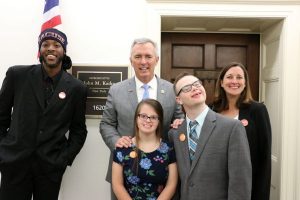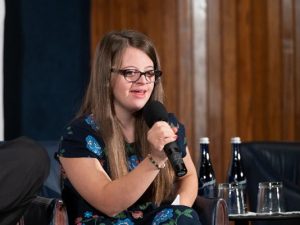Students in Syracuse University’s InclusiveU program spent this year advocating for inclusion for people with intellectual and developmental disabilities beginning with a visit to Capitol Hill last fall and ending with a visit to campus from U.S. Representative John Katko.
 InclusiveU junior Cleo Hamilton, senior Gabby Iannotti and sophomore Ian Coe joined Taishoff Center for Inclusive Higher Education staff on a trip to Washington, D.C., where they partnered with National Down Syndrome Society and the Association of University Centers on Disability for an Advocacy Day, meeting with U.S. Senators Charles E. Schumer and Kirsten Gillibrand’s offices, as well as with Katko. They also attended a hearing on Capitol Hill about the importance of post-secondary employment opportunities for people with intellectual and developmental disabilities.
InclusiveU junior Cleo Hamilton, senior Gabby Iannotti and sophomore Ian Coe joined Taishoff Center for Inclusive Higher Education staff on a trip to Washington, D.C., where they partnered with National Down Syndrome Society and the Association of University Centers on Disability for an Advocacy Day, meeting with U.S. Senators Charles E. Schumer and Kirsten Gillibrand’s offices, as well as with Katko. They also attended a hearing on Capitol Hill about the importance of post-secondary employment opportunities for people with intellectual and developmental disabilities.
The trip was combined with the Washington, D.C., premiere of the documentary film “Intelligent Lives,” hosted in partnership with the Syracuse University Alumni Association. The film features Syracuse alum Micah Fialka-Feldman—who is a pioneer for students with intellectual disabilities—and points to a future in which people of all abilities can fully participate in higher education, meaningful employment, and intimate relationships.
Syracuse University has a rich history of disability advocacy, including founding the first disability studies program in the nation. The creation of the Taishoff Center a decade ago and the growth of InclusiveU, Syracuse University’s program for students with intellectual and developmental disabilities, has continued to position the University as a national leader in the field. Beth Myers, executive director of the center and Lawrence B. Taishoff Assistant Professor of Inclusive Education at the School of Education, views the center’s work as a gateway to a more independent life for young adults with intellectual disabilities.
 “We have experienced significant growth in the field of inclusive higher education these past several years. Not only are more universities developing programs to meet the need of this under-served population, but our partners, community employers and government representatives are gaining a new understanding of how inclusive higher education benefits everyone,” Myers says. “Most of all, we are graduating engaged self-advocates who are ready to contribute to the world around them and who have paved the way for future students with intellectual disabilities to succeed.”
“We have experienced significant growth in the field of inclusive higher education these past several years. Not only are more universities developing programs to meet the need of this under-served population, but our partners, community employers and government representatives are gaining a new understanding of how inclusive higher education benefits everyone,” Myers says. “Most of all, we are graduating engaged self-advocates who are ready to contribute to the world around them and who have paved the way for future students with intellectual disabilities to succeed.”
Representative Katko says that defending the civil liberties of individuals with intellectual and developmental disabilities has always been of the utmost importance to him, and that they must be treated fairly and have access to education and employment opportunities. “I am fully supportive of InclusiveU’s mission and always enjoy the opportunity to interact with students in the program,” Katko says. “I congratulate the students in this year’s graduating class, and I know they will make significant contributions to our society.”
This year’s graduating class of InclusiveU was a record 13 students, anticipated to grow to 20 next year.
